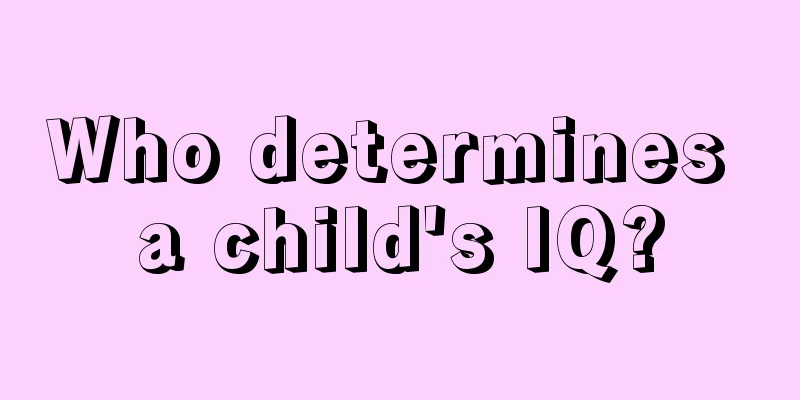Who determines a child's IQ?

|
Parents all have high expectations for their children's IQ. As the saying goes, parents hope their sons will become dragons and their daughters will become phoenixes. As parents, they all hope that their children can have a high IQ. But there are many factors that affect children's IQ. Some people believe that if parents have high IQs, their children will also have high IQs, but in reality, this is not absolute. So, who does a child’s IQ depend on? 1. The results of intelligence tests are affected by the psychological factors of the children at that time. The psychology of infants and young children is extremely unstable and is often disturbed by many factors. During the intelligence test, whether the environment is quiet, the light is soft, the room temperature is moderate, and whether the child gets enough sleep, is in a good mood, and is focused can all directly affect the accuracy and reliability of the test results. So it is often the same child but the results of each intelligence test are different. 2. The scale of intelligence test has certain limitations. The focus of various scales is to test children's sensory and motor aspects, while humans' language ability, abstract thinking ability, and the ability to solve problems creatively are important factors of intelligence. However, these factors have not yet fully developed in infancy and childhood, and the level of sensory and motor abilities cannot truly represent the entirety of intelligence. 3. Intellectual development varies among individuals. The time and speed of intellectual development of each child are different. Some develop early, some develop late, some develop quickly, and some develop slowly. People who are "late bloomers" in ancient and modern times, both in China and abroad, often have average IQs in infancy, or are even not as smart as the children around them. But when they reach a certain age, they will suddenly become enlightened and show special talents in certain areas. 4. The impact of environment and education on intelligence. Whether a child has a high or low IQ only means that he or she has potential. Whether this intellectual potential can be realized depends on the influence of factors such as environment and education. If a child is in a good environment and receives a good education, his or her intellectual potential can be fully developed. Even if his or her intelligence is average or low, he or she can achieve success later in life through hard work. If the environment is bad and parents relax the necessary education, even if the child has a high IQ, it will not be able to be fully utilized and the child will not achieve anything in the future. So don't rashly predict your child's future based on his or her IQ as an infant. Regardless of whether your child's IQ is high or low, don't relax. Provide your child with a good environment and necessary education to promote his or her intellectual development. |
<<: What to do if your child falls off the bed
>>: Why do children speak late?
Recommend
Why does my baby often scratch his ears?
Every move of the baby makes parents very happy, ...
Chylothorax of the newborn
I believe many people know that the body of a new...
What should we pay attention to in children with asthma?
Asthma is a very common disease, which can be div...
What to do if your child has low intelligence? Four tips to help you
In modern society, children are compared in all a...
Reasons why six-year-old children don't like to eat
Children don’t like to eat very much when they ar...
Can children eat deer antler slices?
Deer antler is a tonic that is not only rich in n...
Can children's tics heal themselves without treatment?
Parents need to pay attention to the problem of t...
Is a child's fever of 40 degrees dangerous?
Children's high fever must not exceed 40 degr...
What to do if your child has internal heat and can't defecate
Because the climate is relatively dry in spring a...
Solutions for baby's breathing difficulties
Parents can understand and judge the baby's p...
What to do if your one-year-old baby has bent legs
We all know that babies can already walk around t...
Two and a half year old baby often has fever
Two and a half year old baby often has fever If a...
What is the disease of peeling on the face of a two-month-old baby?
What disease is the peeling on the face of a two-...
How many days does it take for a child to recover from chickenpox?
Parents are most anxious when their children get ...
Why doesn't the baby eat?
One of the most troublesome problems is the child...









